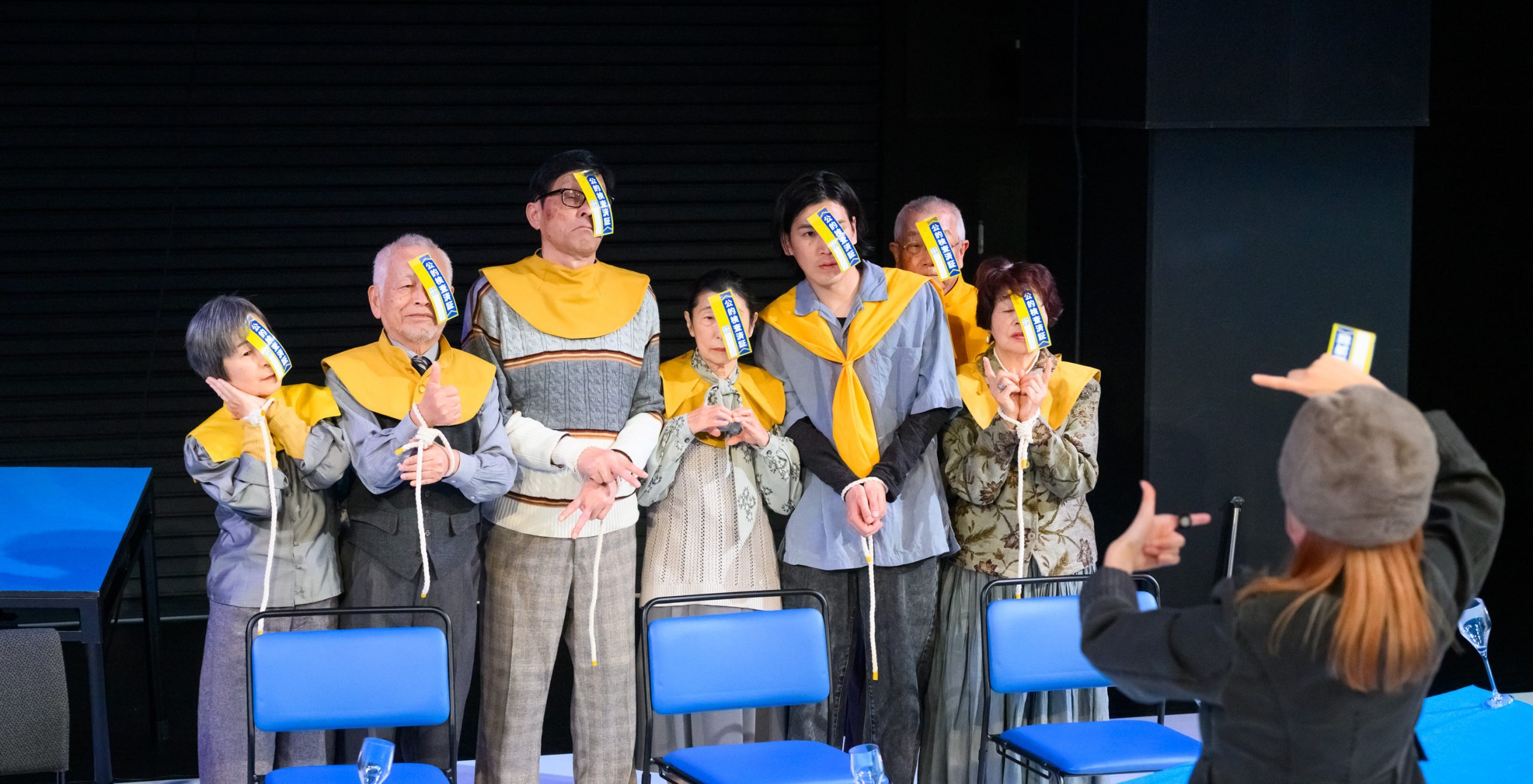
Hiroshi Watanabe / Naoki Sugawara
Looking Back, Looking Forward at a Nation Leading in Theater for Seniors – Two Experts Working in Regional Cities
Photo: Nanako Tomioka
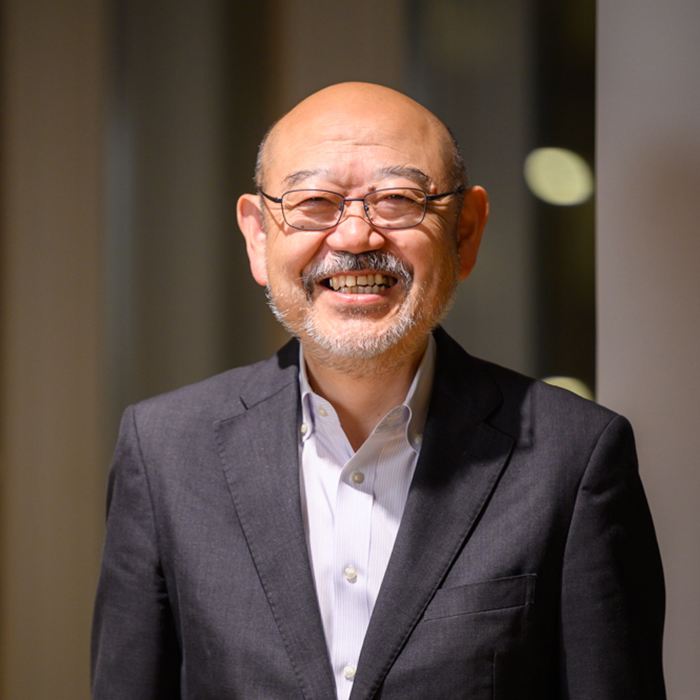
Photo: Nanako Tomioka
Hiroshi Watanabe
Born in Tochigi prefecture in 1953, Watanabe did a range of jobs including editing entertainment listings magazine City Road until 1984 when he became involved in preparations for the opening of the Ginza Saison Theatre, where he engaged in production from 1987 to 1988. In 1989 he was involved in the opening of the Bunkamura cultural complex, where he managed Theatre Cocoon and was involved in both its operations and play production until 2003. In April 2003, he took part in preparations for opening the Matsumoto Performing Arts Center in Nagano prefecture and worked as producer and general manager until 2006. In October 2006, he was appointed Executive Director and Head of Business Operations at the Saitama Arts Theater, where he continues to be a general advisor. In October 2022, he became producer of the Okayama Performing Arts Theatre Harenowa, where he took on the additional post of Director in April 2024. (Updated January 2025)
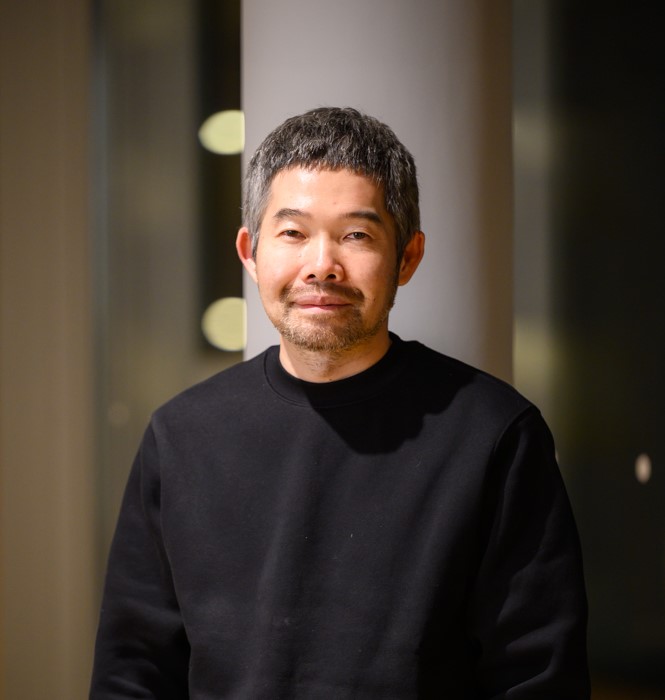
Photo: Nanako Tomioka
Naoki Sugawara
Born in 1983, Sugawara is an actor and certified nursing care worker. A member of Oriza Hirata’s Seinendan Theater Company since 2010, Sugawara has pursued his career in theater while working as a caregiver at special care homes for the elderly. He relocated to the town of Wake in Okayama Prefecture in September of 2012 following the Great East Japan Earthquake, where he founded the theater unit OiBokkeShi and began the Aging and Theater Workshop program. With an 88-year-old man named Tadao Okada whom he met during a workshop as the lead actor, OiBokkeShi held its first performance in 2015; Theatre of Wandering: Night Never Gets Darker was set in the shopping arcade in front of Wake Station, Since then, Sugawara has been working under the concept of “bringing the knowledge of theater to caregiving, bringing the depth of caregiving knowledge to the theater studio.” The works that OiBokkeShi have presented up to now include High School for the Elderly (2015), Portable Toilet Theater (2018), and Re-Creation Ceremony (2023). In 2016, he shifted his base of operations to the town of Nagi, Okayama. He is involved in many invitational performances and projects outside his own company such as a collaboration with Saitama Gold Theater in 2018 as part of World Gold Theater to create Theatre of Wandering: Night Never Gets Darker – Urawa Version, and an OiBokkeShi and Mie Center for the Arts co-production of art projects such as Enjoying Care and Aging Brightly (since 2017). In 2018 he won the 69th Minister of Education, Culture, Sports, Science and Technology’s Art Encouragement Prize for New Artists (development of the arts).(Updated Jan.2025n 1983, Sugawara is an actor and certified nursing care worker. A member of Oriza Hirata’s Seinendan Theater Company since 2010, Sugawara has pursued his career in theater while working as a caregiver at special care homes for the elderly. He relocated to the town of Wake in Okayama Prefecture in September of 2012 following the Great East Japan Earthquake, where he founded the theater unit OiBokkeShi and began the Aging and Theater Workshop program. With an 88-year-old man named Tadao Okada whom he met during a workshop as the lead actor, OiBokkeShi held its first performance in 2015; Theatre of Wandering: Night Never Gets Darker was set in the shopping arcade in front of Wake Station, Since then, Sugawara has been working under the concept of “bringing the knowledge of theater to caregiving, bringing the depth of caregiving knowledge to the theater studio.” The works that OiBokkeShi have presented up to now include High School for the Elderly (2015), Portable Toilet Theater (2018), and Re-Creation Ceremony (2023). In 2016, he shifted his base of operations to the town of Nagi, Okayama. He is involved in many invitational performances and projects outside his own company such as a collaboration with Saitama Gold Theater in 2018 as part of World Gold Theater to create Theatre of Wandering: Night Never Gets Darker – Urawa Version, and an OiBokkeShi and Mie Center for the Arts co-production of art projects such as Enjoying Care and Aging Brightly (since 2017). In 2018 he won the 69th Minister of Education, Culture, Sports, Science and Technology’s Art Encouragement Prize for New Artists (development of the arts).(Updated in January 2025)
OiBokkeShi
https://oibokkeshi.net/
In Japan’s challenge to address its aging population, theater is among the numerous unique programs centering seniors. Theater world legend Yukio Ninagawa established the Saitama Gold Theater company for seniors and Hiroshi Watanabe accompanied him as producer in his relentless pursuit of artistry. Naoki Sugawara is the leader of OiBokkeShi, a company that brings out the potential of individuals from a care perspective in a combination of aging care and theater. These two theater makers with differing yet converging approaches have paired up in Okayama prefecture to create theater for seniors that looks ahead to a new phase. These two key players expanding the possibilities of seniors’ theater in Japan looked back on their experiences and talked about their plans for the future.
Interview/Text: Rei Kumai
English Translation: Claire Tanaka
Saitama Gold Theater, Fitting with the Times
- Saitama Gold Theater was founded in 2006 by Yukio Ninagawa, the renowned director and then-Artistic Director of Saitama Arts Theater, who recruited members aged 55 and above. Tell me how it came to be.
- Watanabe: Ninagawa had long intended to create Saitama Gold Theater, inspired by Tadeusz Kantor‘s1 Cricot 2 Theatre production of The Dead Class in which many senior actors appear. Ninagawa had been making theater with professional actors, but I think he began to think about the importance of making theater with ordinary citizens when he became Artistic Director of a public theater, to incorporate a public perspective into theaters. When he first recruited participants, he didn’t know if Gold Theater would become a performing group, and started it slowly, but 1266 people applied to participate. Ninagawa, myself, and the other theater staff were surprised to see that level of interest. When I look back on it now, I think that was a period when a lot of people had just reached retirement age and were thinking about how to spend their so-called second life.2 I think many who had always wanted to try acting felt a renewed interest when presented with the opportunity to perform with the great Ninagawa. In the end, 48 people were selected from the 1266 applicants, and they went through six months of training before putting on their trial performance, Pro-cess.
- You said Gold Theater started slowly, but the group put on one or two plays every year from the year after it started and even performed in Paris in 2013. The group expanded its activities at an impressive speed.
- Watanabe: Ninagawa really is a practical person, so he just wanted to get on with putting on shows. At the second Pro-cess, we put on Ravens, We Shall Load Bullets written by Kunio Shimizu, but after several of such trial performances, Ninagawa and I began to talk about how we’d like to try staging a new work and went to ask several playwrights. A lot of them said it wouldn’t be possible to write a play with nearly fifty actors. Just when we were starting to think it wouldn’t work out, Ryo Iwamatsu said he wanted to give it a try, and we achieved our first official show, Picnic On Board (2007). Then, KERA (Keralino Sandorovich), who had come to see that show, said that he would also write something, and our third show was a new work by KERA titled One Night of the Ando Family (2009). Shu Matsui, who came to see that, wrote our fourth show, Sacred Land (2010)… and that’s how Gold Theater began its adventure staging new plays by Japan’s foremost playwrights. Ninagawa himself hadn’t put on many plays written by people younger than himself until that time, so I think this was a big endeavor for him as well. With the Paris show, we were invited by the Maison de la culture du Japon à Paris and performed there, and thanks to that show, we began to do more shows overseas, including Hong Kong and Romania.
-
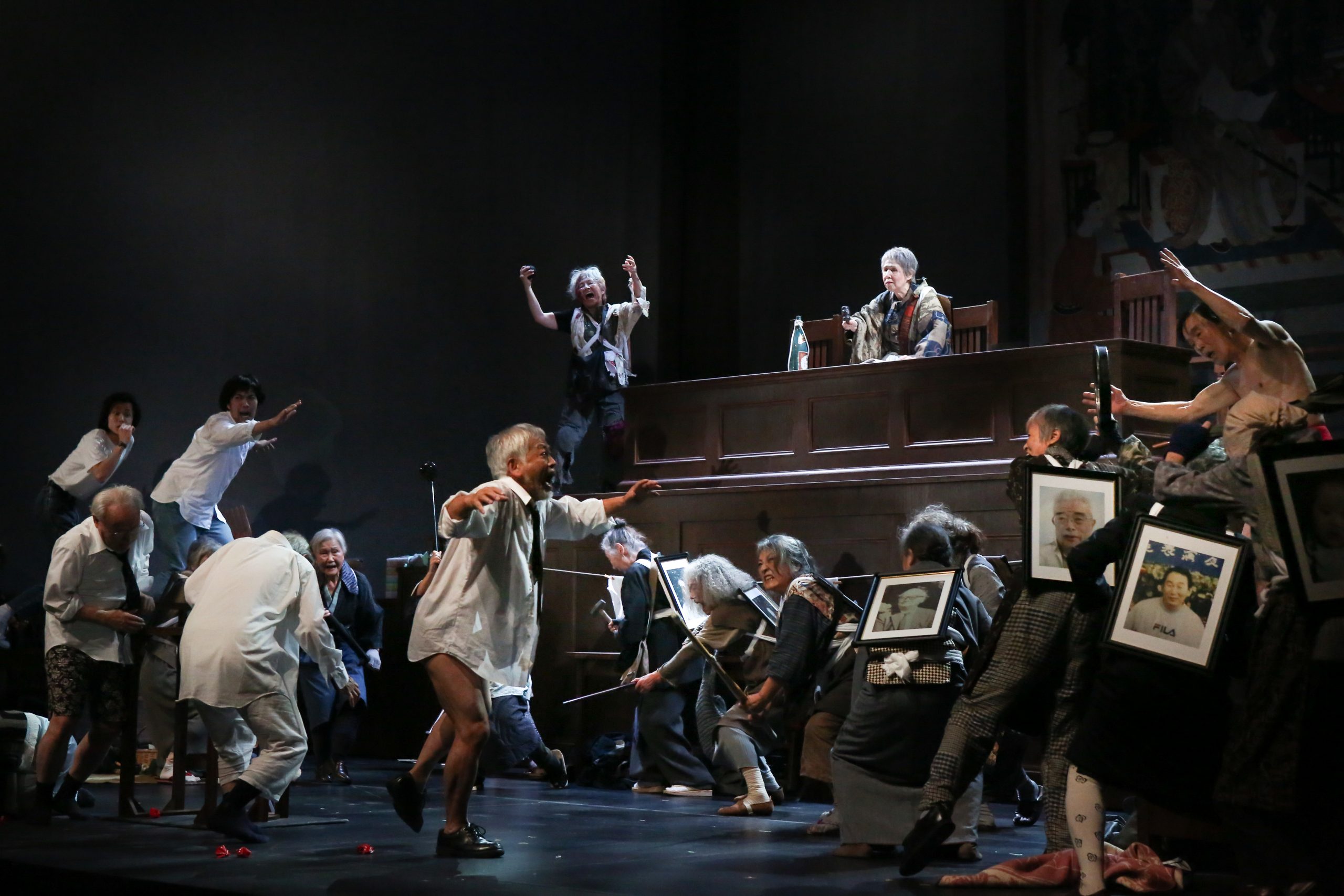
Saitama Gold Theater’s Ravens, We Shall Load Bullets at Hong Kong (2014) Photo: Maiko Miyagawa
- Around this time, Sugawara, you were working as an actor in Tokyo but moved to Okayama in 2012 after the Great East Japan Earthquake. Then, in 2014 you established OiBokkeShi in the town of Wake where you were living.
- Sugawara: After I moved to Okayama, I worked at a special care home for the elderly, but after a while I started wanting to do theater again. One reason for this was that while working in the care home I began to feel that nursing care and theater are extremely compatible. At first, I held a workshop for local residents, and thought I’d like to start a theater company based on this theme of compatibility between nursing care and theater, and that’s how OiBokkeShi came about. The name was suggested by a designer who is also a member of the company, spelling out the Japanese words for “get old, go senile, die.” There is also an Okayama dialect word “bokke” which means “great” so I thought it had a good ring to it and settled on OiBokkeShi.
- The year following the establishment of OiBokkeShi, in 2015, you debuted Theatre of Wandering: Night Never Gets Darker, which has been staged frequently since then. This was the first play you wrote and directed.
- Sugawara: I met Tadao Okada (born in 1926, he is the star lead actor of OiBokkeShi) through a workshop, and Mr. Okada called me “Director” [Laughs] so I thought I’d try being a director and wrote a script and tried directing it. I usually work by listening to people talk and expanding those ideas into stories, but with Mr. Okada, I thought it would be difficult for him to remember a lot of lines and I wanted to make his role as similar to his actual self as possible, so I cast him as a senior looking for his wife with dementia. The people from the local shopping arcade were helping with the play, so rather than staging it in a theater we put it on in the shopping arcade, and it became a street play.
-
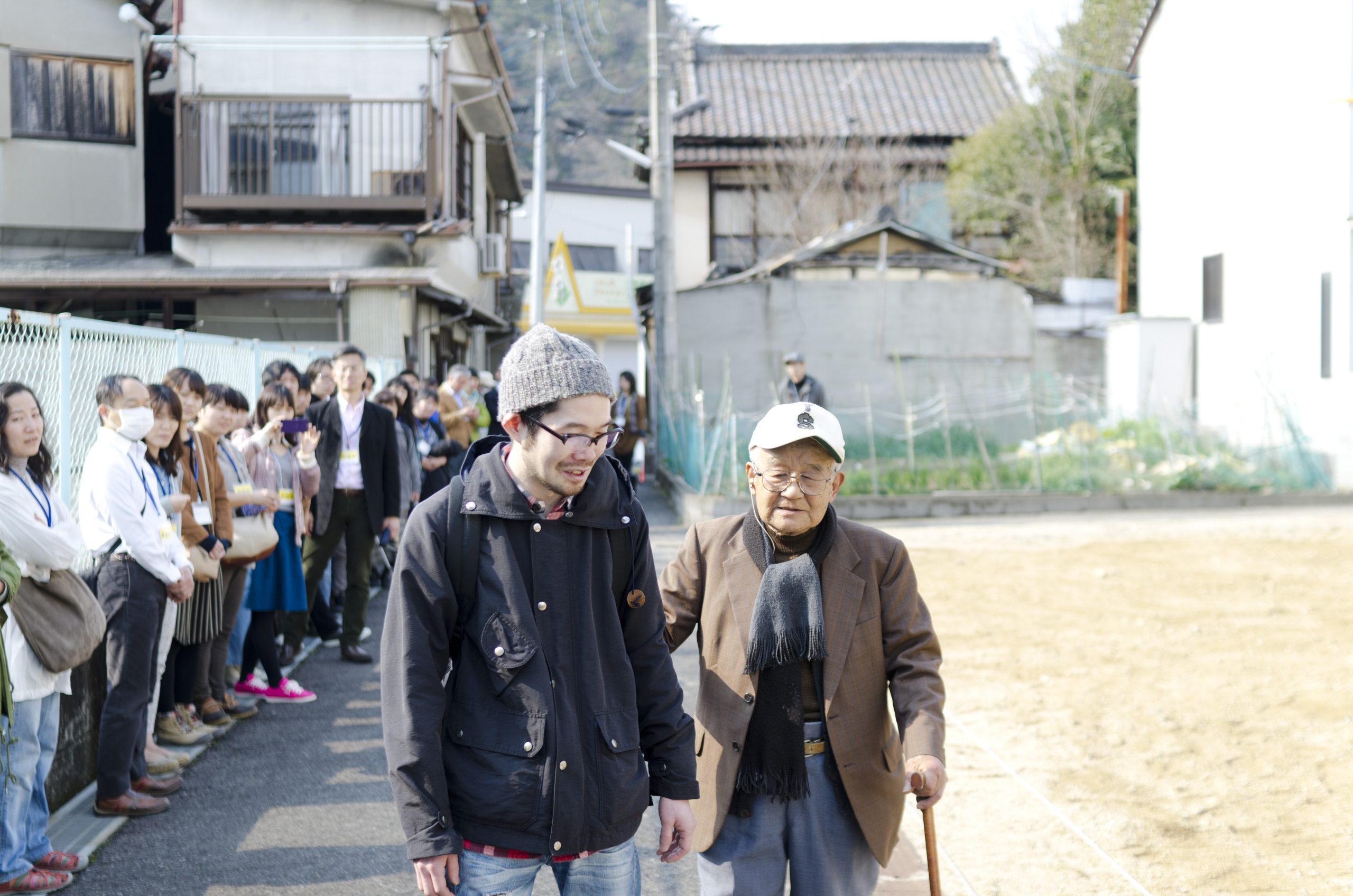
Tadao Okada, the star lead actor of OiBokkeShi(Right) and Sugawara at Theatre of Wandering: Night Never Gets Darker
From Saitama to the World, Activities Bring People Together
- Gold Theater went on to put on a dance performance called KOMA’ (2014) directed and choreographed by Azusa Seyama, a dancer from Pina Bauch’s Tanztheater Wuppertal, and in 2015 it put on Richard II as part of the 30th Sai no Kuni Shakespeare Series, but in 2016, the group lost its greatest supporter with the passing of Ninagawa. In that same year, a large-scale project, The 10,000 Gold Theater 2016 performing The Gold Symphony, My Dream, Your Dream, was planned.3
- Watanabe: That was really tough. We got the help of Seiji Nozoe for The 10,000 Gold Theater and managed to stage it, and we had been planning from the start to stage a new play by Ryo Iwamatsu in 2017, The Mass of Pale Pink/Usui Momoiro no Katamari, which was directed by Iwamatsu. We were actually also considering the dissolution of Gold Theater at the same time.
-
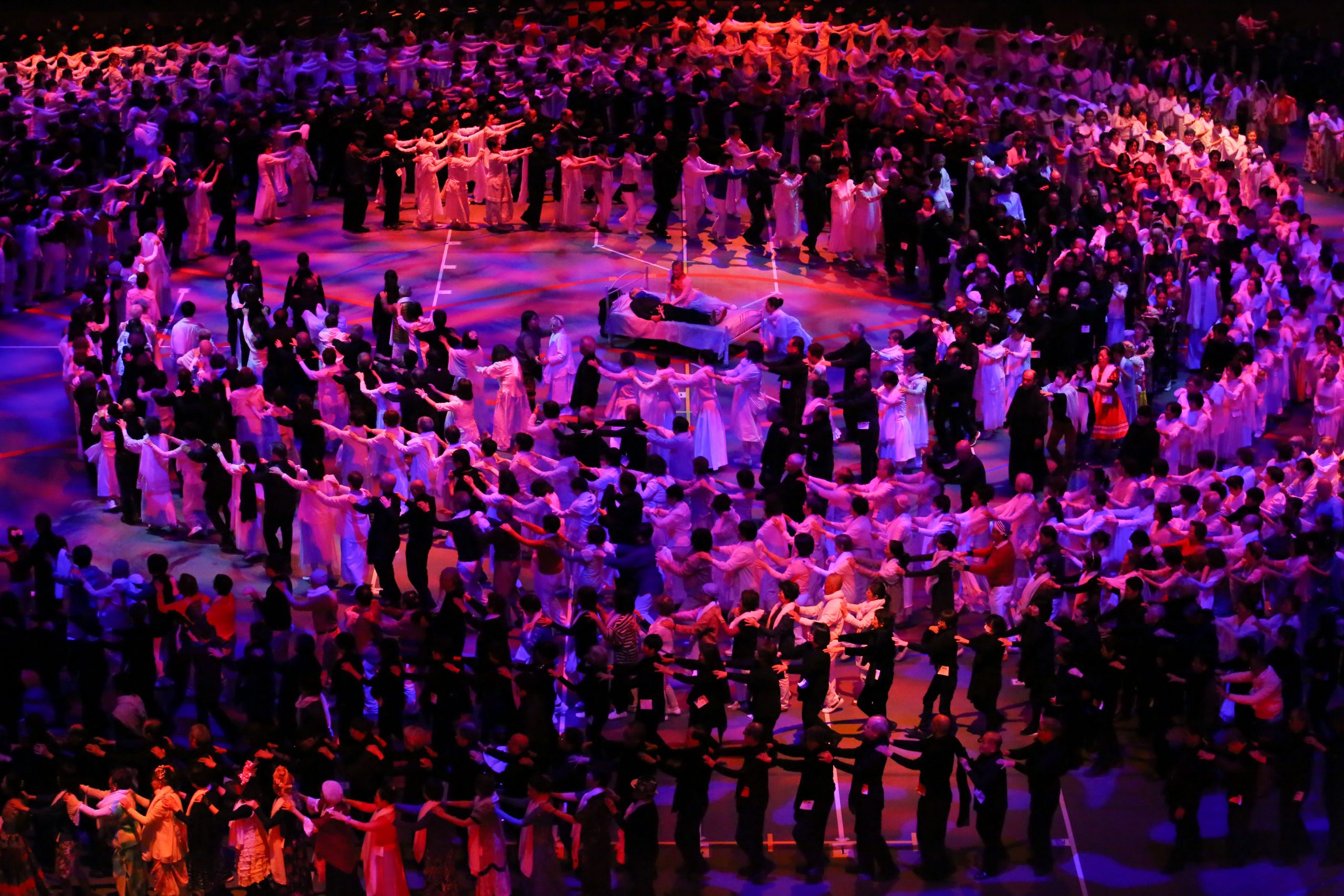
The 10,000 Gold Theater 2016 performing The Gold Symphony, My Dream, Your Dream (2016) Photo: Maiko Miyagawa
- Then, in 2018, World Gold Theater 20184 was held at Saitama Arts Theater. Sugawara also participated in World Gold Theater 2018, didn’t he?
- Watanabe: Not long before Ninagawa died, actually some people from a theater in the UK came to observe Saitama Gold Theater. It was when we were putting on Richard Ⅱ, and everyone who came to see the show was so surprised and said, “Look at what Japan’s great Ninagawa is doing!” which left an impression on me. [Laughs] They went home and spread our story and thanks to that, when we went to do some observation in the UK, people asked us about the Gold Theater, and we learned a lot about the different experiments going on at Saddler’s Wells and other theaters in the UK. That was what led us to hold World Gold Theater.
- Sugawara: As part of World Gold Theater, I put on Theatre of Wandering: Night Never Gets Darker – Urawa Version with the members of Saitama Gold Theater. Until then, I’d been making plays with the people around me in Okayama, so by making it in Saitama, a different place, I was able to see my work from a Japanese and international perspective. My encounter with Gold Theater was very important for me.
-
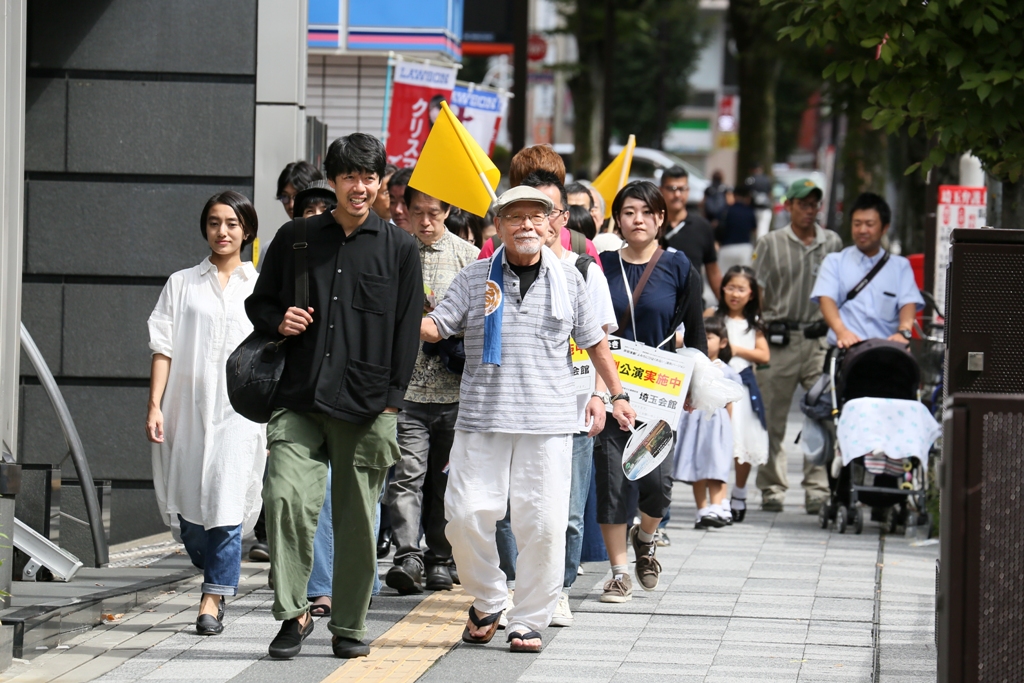
Theatre of Wandering: Night Never Gets Darker – Urawa Version(2016) Photo: Maiko Miyagawa
- In 2021, you joined some members of Gold Theater in the Japan-UK international co-production of The Digital Home5 and produced a Coventry version of Theatre of Wandering: Night Never Gets Darker for Coventry UK City of Culture 2021. You’re involved in more and more international creations.
- Sugawara: It was refreshing to see the differences in nursing care when making plays with people from another country. For example, in the UK, there is a strong emphasis on independence and the rights of seniors, so they value the voices of people having those experiences. When making the Theatre of Wandering, not only did we listen to the opinion of the actor playing a person with dementia, we also asked doctors and medical professionals who are ordinarily interacting with such people to participate and listen to their opinions on the typical symptoms and behavior of a person with dementia.
-
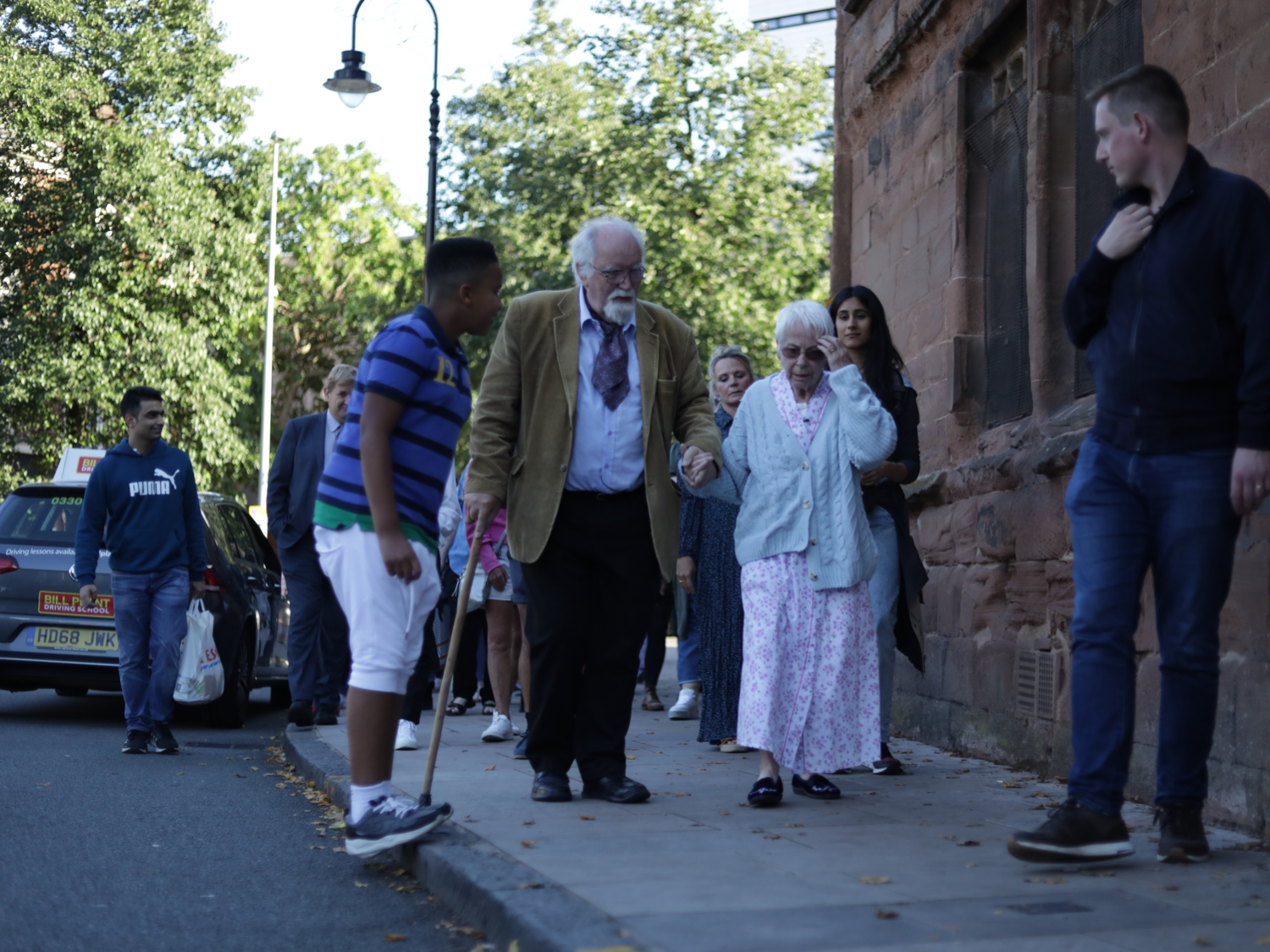
Coventry version of Theatre of Wandering: Night Never Gets Darker for Coventry UK City of Culture 2021.
- You’ve also done research in Thailand, haven’t you?
- Sugawara: Yes. In Thailand, there is a deep-rooted culture of children caring for their aging parents in their own homes, so there are very few nursing homes for seniors. I also spoke to Thai artists about this, for example I heard about a photographer who is caring for their parents with dementia and uses them as models in their photography. I got the impression that Thailand was still working on “socializing” its nursing care.
- Watanabe: In 2014, when Gold Theater was invited to Hong Kong for the New Vision Arts Festival, a Hong Kong senior theater company came to see the show, and there were members still active into their 90s. I don’t know the exact numbers, but I think there are more senior theater companies around the world than you might expect.
Due to COVID-19, the World Became Like a Nursing Care Home
- While COVID-19 ran rampant, Saitama Gold Theater announced that it would stage Sacred Land 2030 in 2021. Sacred Land 2030 takes the theme of euthanasia from Shu Matsui’s Sacred Land, performed by Gold Theater in 2010, and was to be staged with Matsui himself as director and Sugawara as part of the cast. But due to COVID-19, Sacred Land 2030 couldn’t be staged, and at the end of that year, Saitama Gold Theater ended its 15 years of activities with The Water Station.
- Watanabe: COVID-19 made it difficult to continue Gold Theater. We would ask people to get together for rehearsal, and they would say, “I’m staying in a facility and I mustn’t bring in bacteria and viruses from the outside, so I can’t go to rehearsal,” or, “my legs have gotten weaker, so it’s physically too much for me.” A lot of people gave such reasons for leaving the company, and I felt like COVID-19 had a distancing effect on many things in our lives. While this was happening, I remembered how Kunio Sugihara had put on The Water Station (written by Shogo Ota) in 2019 with his company KUNIO. The Water Station is a nonverbal play, so people wouldn’t have to learn any lines, and since no lines are spoken, there is less concern for infection. I thought, “This is perfect for Gold Theater!” and immediately approached Sugihara.
- The Water Station was performed by 18 Gold Theater members, and we used props from previous Gold Theater productions for the stage design, and while it was a nonverbal play, there were several messages embedded in the staging. Sugawara once said, “I think perhaps aging means going from ‘doing’ to ‘being’” and I think that final show distinctly expressed the presence of Gold Theater.
- Watanabe: Some members wanted to keep going, but the average age when we recruited members had been 67 and that average had come to exceed 80. Some had passed away, and it was difficult to realistically continue our activities as a company. But some former members are still actively appearing in films and stage performances. Actually, several of the former Gold Theater members came to audition for The Final Stop: Masayume, so individually some are continuing to perform.
-
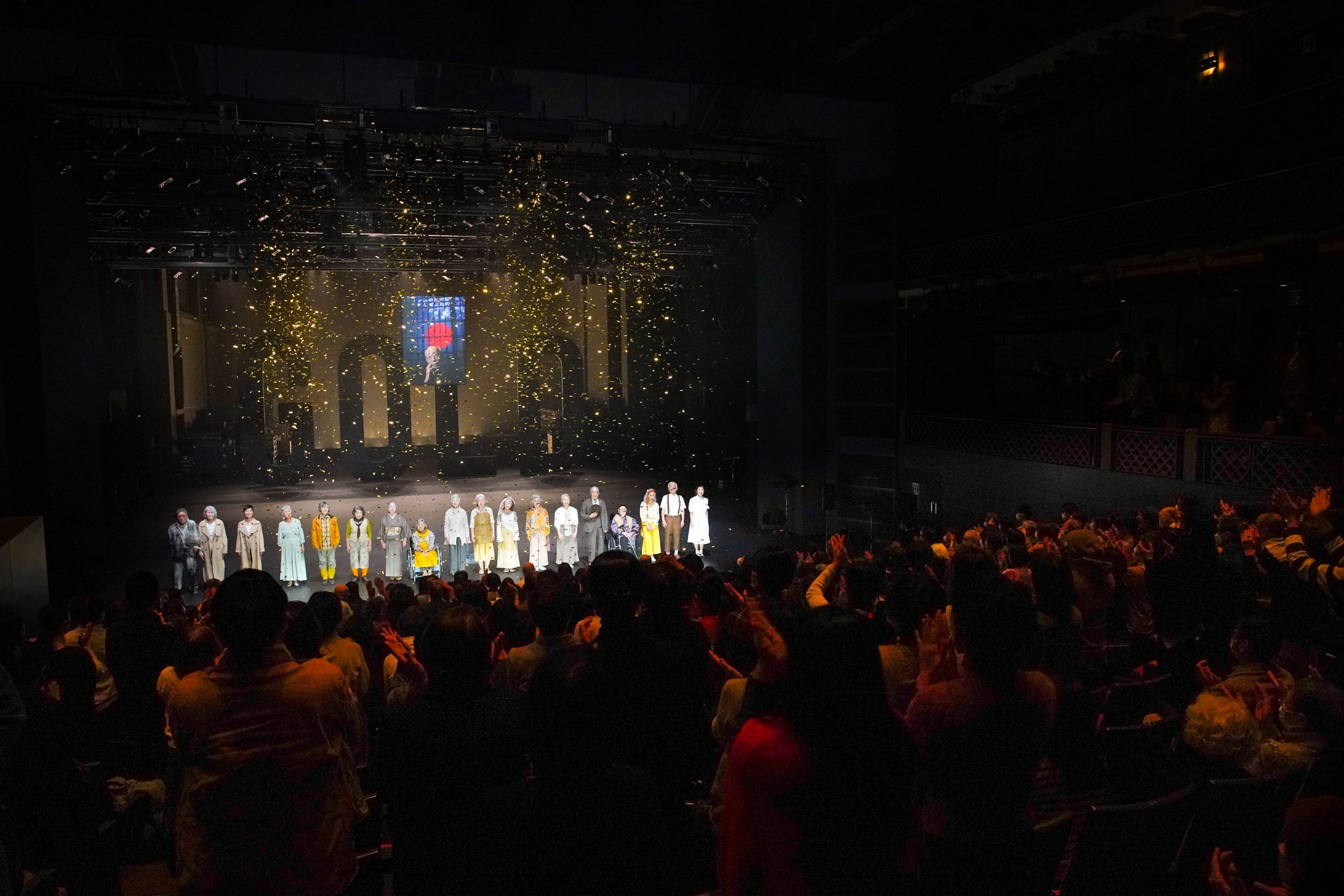
Curtain call at Gold Theater’s final production,The Water Station (2021) Photo: Maiko Miyagawa
- COVID-19 left a big impact, not just for seniors doing expressive activities.
- Sugawara: For me, the COVID-19 pandemic made me feel that, “The whole world is like a nursing home.” Everyone was stuck inside, not able to go where they wanted to go, not able to meet with people they wanted to meet. I thought that situation was like a nursing home. In fact, I experienced one thing that I can never forget. The work of a caregiver at a nursing home is mainly to assist with meals, with going to the restroom, and with bathing, but if you prioritize efficiency, there’s a tendency to value having people eat and bathe as fast as possible. But when that happens, the experience of living itself becomes very sparse. One day during mealtime, a resident wasn’t eating their meal, and I thought maybe they couldn’t eat it on their own, but when I said, “Shall I help you eat?” they replied, “I don’t want to eat anymore. There’s no point in living.” I didn’t know how to reply and I was stuck, but during that time at the nursing home, I had been putting on a lot of kamishibai shows such as The Toad Oil Salesman6 so I said, “Tomorrow, I’ll do The Toad Oil Salesman so you have a little something to look forward to.” I thought that talking to the residents like this was something I could do, so I tried that. You could also say, “Next time, let’s draw pictures together,” or, “I hope you’ll sing for me again.” If there’s something that person can look forward to, I felt like that helps them to think, “I’ll try to live a little longer. I’ll try to eat a little more.” During the COVID-19 pandemic, those cultural things and interactions between people decreased more and more, and opportunities to give people the will to live diminished. I keenly feel the importance of being able to go and see people you want to see and pursuing the hobbies you love. In other words, arts and culture are vital to people and we need to protect them.
Connecting Okayama to the World Through Expressive Activities With Seniors
- Now that the COVID-19 pandemic has begun to subside, you’re putting on a completely new The Final Stop: Masayume based on Sacred Land 2030 in three cities between 2024 to 2025. The unusual play is set on a spaceship bound for Masayume, an enormous amusement park, and four actors including Sugawara and seniors selected from auditions in Okayama, Mie, and Saitama, improvise a meeting to “remove one useless person from the spaceship.” It is being created at the Okayama Performing Arts Theatre, Harenowa7 where you are an Artistic Director.
- Watanabe: First, I took on the job at Okayama Performing Arts Theatre Harenowa because Sugawara is in Okayama. So naturally I think that a core component of Harenowa will be building the future of theater for seniors together with people who want to collaborate with Sugawara. Until now, creating theater has been about creating new forms by directing actors in various ways, but now I think we need to use this method like Sugawara has been, creating works that utilize a person’s existence as it is. I want to use Sugawara’s experiences as a base to spring off from, to look forward and make works together.
- Sugawara: Ever since Harenowa opened in September 2023, OiBokkeShi has been putting on a work called Re-Creation Ceremony there, and the Okayama version of Aging Play Park8 came into being there, enabling us to expand our activities in Okayama. I think being able to make new works that are not limited to the framework of theater for seniors, such as when Matsui came to Okayama from Tokyo to put on The Final Stop: Masayume, is something really wonderful.
- The word “world” came up; at World Gold Theater, I got a sense of the differences in direction for each participating group, with some emphasizing improving the artistry of the work, and others focusing on improving the care of participants. What do you two think of this?
- Watanabe: I think Gold Theater was well-regarded because of the artistic aspects. Ninagawa worked to improve the artistic value of Gold Theater as much as possible, and I think the people who came from the UK to observe were impressed by Gold Theater’s high level of quality, so I believe that artistry is essential.
- Sugawara: I also want to surprise people, or rather I always wish I could create new expressions. I’m happy when I can make people think, “Look at the possibilities of theater!” by connecting nursing care and theater, or dementia and theater. I use nursing care and dementia as themes, but I’m always thinking about interesting things that can be done with theater. I would like to create an initiative involving seniors in theater that represents Japan, and it would be great if Okayama could connect with the world.
- Watanabe: Yes. It’s great if something very local can cross paths with the world.
-
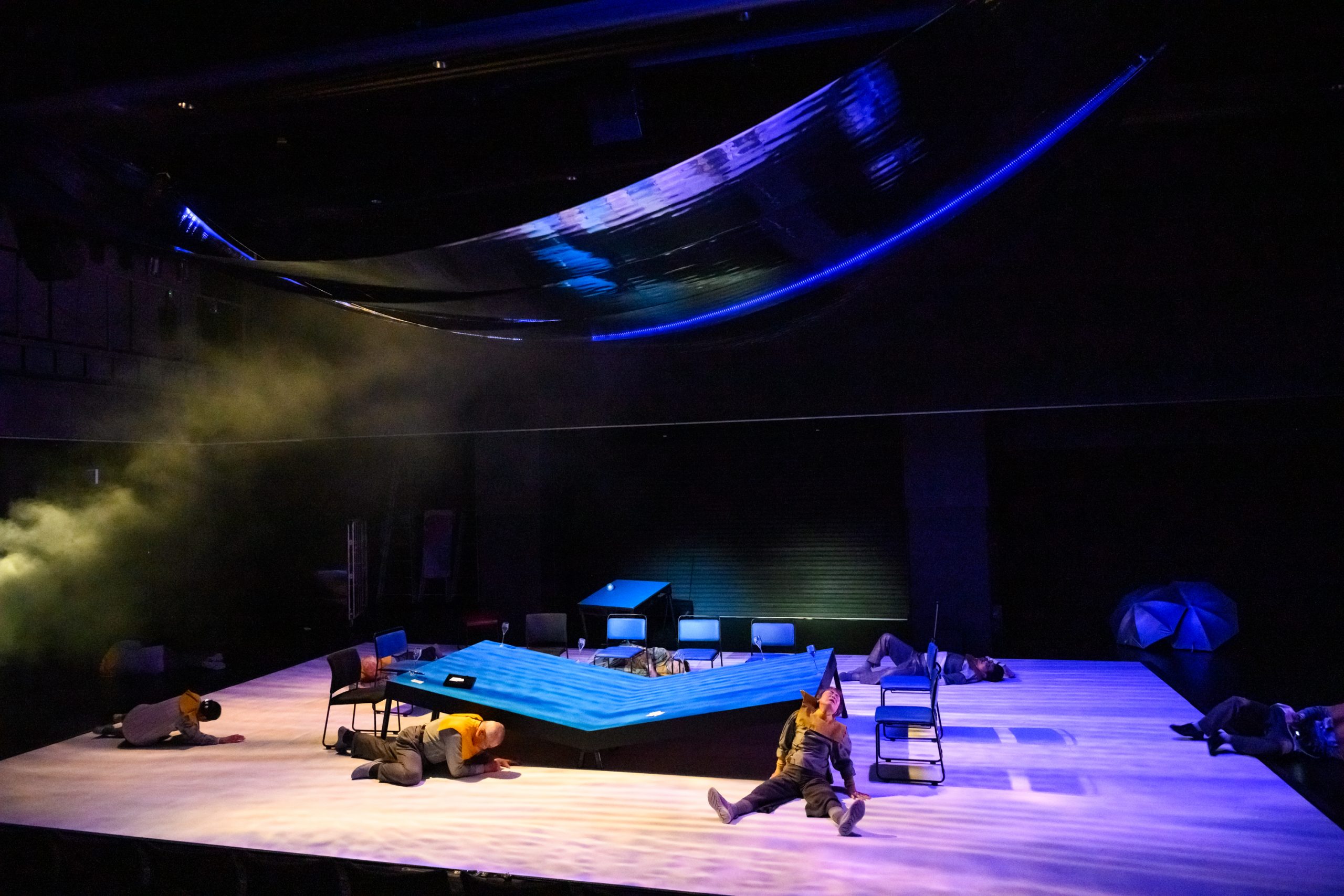
Photo: Nanako Tomioka
The Final Stop: Masayume
Playwright/Director: Shu Matsui
Directing Assistance: Naoki Sugawara
Starring: Ken Kuboi, Naoki Sugawara, Soge Shin, Daigo Shinozaki, Chika Araki,
Seniors chosen from auditions in Okayama, Mie, and Saitama: Kayo Ishikawa, Yoko Inoue, Keiko Imae, Takamasa Ogawa, Masatake Takei, Koji Yamada
Okayama: November 29 to December 1, 2024, Okayama Performing Arts Theatre Harenowa Pit Theatre
Mie: December 21, 22, 2024, Mie Prefecture Fine Arts Center Theater
Saitama: January 11 to 13, 2025, Saitama Arts Theater Adaptable Theater
-
Tadeusz Kantor
Tadeusz Kantor (1915-1990) Director, painter, and set designer from Poland. A genius of the modern theater world of the 20th century, he led the creative group Cricot 2 Theatre, which was made up of painters, poets, and other artists.
-
a period when a lot of people had just reached retirement age
Japan became an aging society in the 1970s, and in 2007 the percentage of the population aged 65 or over exceeded 21% making it a super-aging society. The people born in the post-WWII baby boom around 1947-1949 reached retirement age in 2007-2009. Source: Annual Report on the Aging Society: 2008 (Cabinet Office Japan)
-
The 10,000 Gold Theater 2016 performing The Gold Symphony, My Dream, Your Dream
The 10,000 Gold Theater 2016 performing The Gold Symphony, My Dream, Your Dream was performed at the Saitama Super Arena and made up of approximately 1600 members of the public over the age of 60 who responded to an open call, Saitama Gold Theater, and members of Saitama Next Theater, a program formed in 2009 with the goal of training young actors.
-
World Gold Theater 2018
World Gold Theater 2018 was a senior generation art activities festival held with the theme, “The possibilities of arts and culture in aging society—What can theater provide to regional localities?” Theater and dance groups from the UK, Singapore, Australia, and more were invited, and from Japan, the Saitama Arts Theater’s Gold Arts Club, an art club activity group for people over the age of 60, and Gold Theater members participated. There was also a symposium.
-
The Digital Home
This online immersive theater work was set in an imaginary nursing home in the UK called The Home and an imaginary nursing home called Aozora in the Japanese branch. The Japanese version was written and directed by Sugawara, and the UK version was written and directed by Christopher Green.
-
toad oil salesmen
Toad Oil is an ointment said to contain the secretions of toads, and since early modern times, this ointment has been sold at open street stalls by sellers called toad oil salesmen who attract customers with a unique sales patter. This sales patter is now carried on as a traditional art.
-
Okayama Performing Arts Theatre, Harenowa
in 2023, Okayama City, Okayama prefecture opened an arts complex featuring a large, medium, and small stage. It is known as Harenowa.
-
Aging Play Park
Sugawara and Mie Center for the Arts began this art project together with Mie seniors, nursing care-related people, and people with dementia.
-
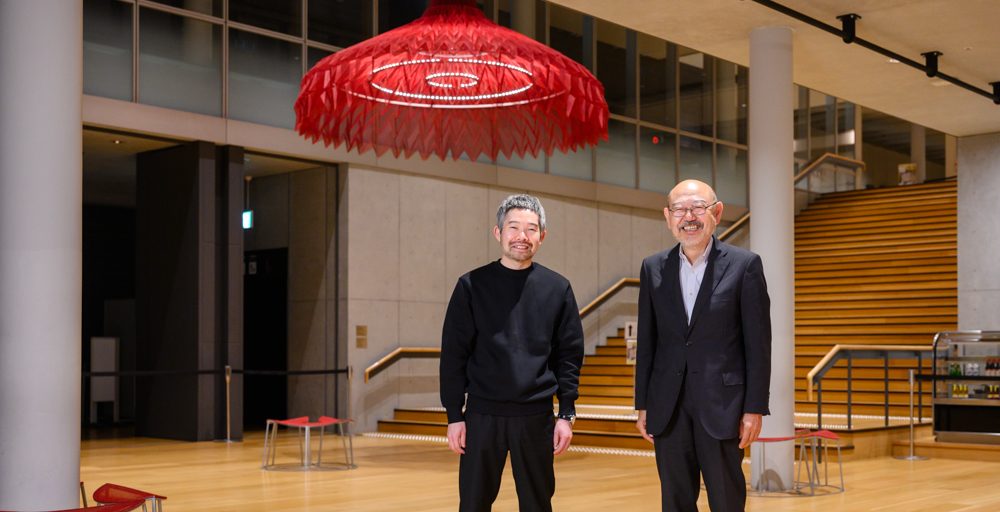
Special thanks to Okayama Performing Arts Theatre, Harenowa Photo: Nanako Tomioka

